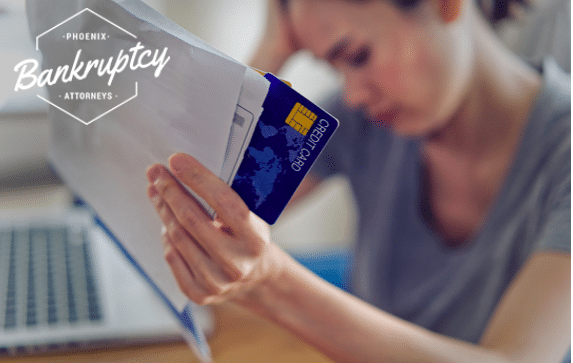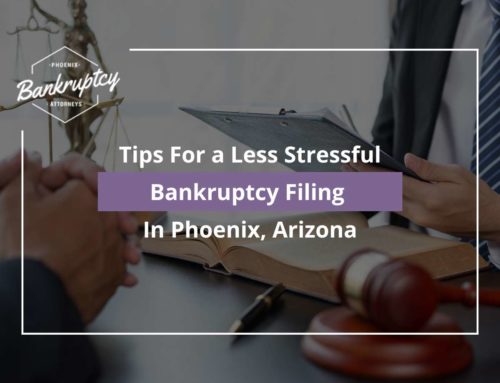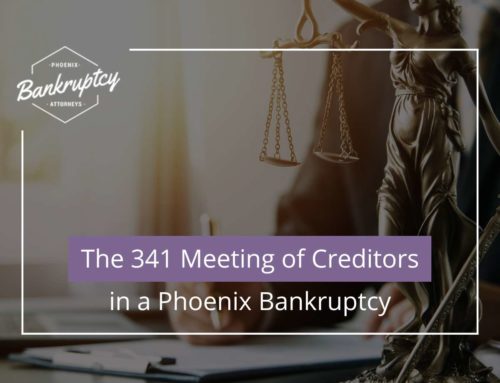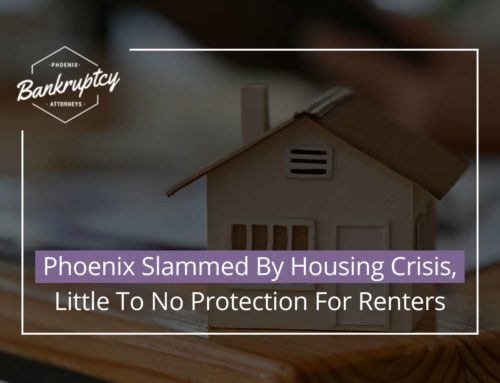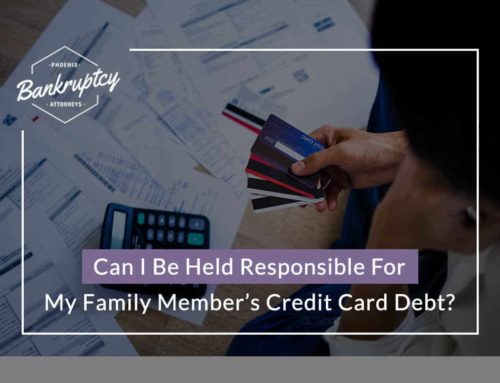What Debts Can Be Discharged in Chapter 7 Bankruptcy?
Phoenix Bankruptcy Lawyers Discuss Chapter 7 Bankruptcy and What is Able to be Discharged
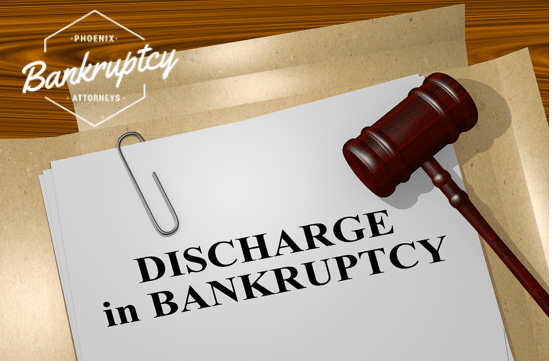 Filing Chapter 7 bankruptcy in Phoenix, AZ can be a great way to address your debt problem if you meet the income eligibility requirements. However, depending on the types of debt you have, Chapter 7 might not do you much good at all. If you qualify for bankruptcy, you need to understand your debt structure to help you make the choice whether or not to file, and which chapter to use.
Filing Chapter 7 bankruptcy in Phoenix, AZ can be a great way to address your debt problem if you meet the income eligibility requirements. However, depending on the types of debt you have, Chapter 7 might not do you much good at all. If you qualify for bankruptcy, you need to understand your debt structure to help you make the choice whether or not to file, and which chapter to use.
Debts That Can Be Discharged
- Credit cards- For the most part, credit card debt is dischargeable, and one of the most common reasons that people file bankruptcy. However, you can’t open up new credit cards and max them out as part of your bankruptcy plan. To prevent people from taking advantage of the system like this, bankruptcy laws are written so that credit card debts incurred 90 days or less before the bankruptcy petition is filed are presumed to be fraudulent. In this context, fraudulent means the debtor opened the credit card planning to discharge it in bankruptcy, with no intention ever to pay off the debt. If you must use your credit cards in the period leading up to your bankruptcy, don’t use them to buy luxury products. Your chances of having the credit card balance discharged in the bankruptcy will increase if you only bought essential items.
- Auto accident and other civil claims- Unless you caused an accident due to driving under the influence, personal injury claims arising out of a car accident are dischargeable. Civil claims judgments may also be discharged as long as they don’t involve you being held liable for fraud. Most judgments from former landlords, like unpaid rent, can be cleared in bankruptcy.
- Medical and Hospital bills- This is the number one reason that people in the United States file bankruptcy. It’s no secret that medical expenses in the United States are outlandish, and most people don’t have sufficient savings to pay for an unexpected medical emergency. Some medical patients are lucky, and their doctors never credit report and attempt to collect unpaid bills. If you aren’t so lucky, Chapter 7 discharges all medical debt incurred before your date of filing. You should keep in mind that your doctor may discontinue treatment if you discharge their bills. Emergency rooms can’t refuse you after a bankruptcy, but you may need to find a new specialist or repay the discharged debt for your doctor to resume treatment.
- Deficiency balances- When your car or other asset is repossessed by your lender, you may have a remaining balance even after your car is sold at auction. Because you no longer have possession of the vehicle, this becomes an unsecured debt which is dischargeable in Chapter 7 bankruptcy.
- IRS debt*- Your back taxes may be discharged in a Chapter 7 bankruptcy if they meet a few requirements. First, the taxes must have been due for at least 3 years. Second, they must have been filed at least 2 years before the bankruptcy petition is filed. Third, they must have been assessed at least 240 days prior. Lastly, the tax debt will be non-dischargeable if you committed tax fraud in that year.
- Personal loans- As long as your personal loans aren’t secured to an asset as collateral, they will be discharged in Chapter 7 bankruptcy. You can’t pick and choose which debts to include in your bankruptcy, so even cash loans from friends and family must be included in your petition.
Debts That Can’t Be Discharged by Filing Chapter 7 Bankruptcy in Phoenix, Arizona
Below are all of the things that CAN NOT be discharged in a Chapter 7 Bankruptcy Filing in Arizona.
- Domestic obligations- Child support and spousal maintenance are generally exempt from bankruptcy. Not only are they not discharged in bankruptcy, but collection for these debts doesn’t halt during the Automatic Stay like all other types of debts. Domestic obligations can also garnish your wages at a much higher rate than standard debts: up to 50%, or if you have no dependents, 60%, and an additional 5% is added if the debtor is more than 12 weeks behind on payments.
- Junior mortgages- You may have heard that your junior or secondary mortgage on your home can be discharged in bankruptcy. This is only true for Chapter 13, and Chapter 7 doesn’t provide this advantage. If you owe more on your home than it is worth, and have a junior lien on top of that, this can be “crammed down,” or essentially discharged, in Chapter 13. You must remain current on all mortgage payments for a home you wish to keep in a Phoenix Chapter 7 bankruptcy.
- Title loans- Even if you have fully paid off your vehicle, it will become a secured asset if you take out a title loan. Your legal obligation to pay the debt will technically be discharged, but the lien on your vehicle will not. If you don’t keep paying on your title loan, the lender can proceed with repossession of your vehicle. You will have the option to redeem your vehicle in Chapter 7 bankruptcy, which means paying off the loan in one payment, but only to the extent of the value of the car. If you have a $6,000 title loan, and your vehicle is worth $5,000, you could redeem your vehicle for a one-time payment of $5,000. However, people filing Chapter 7 bankruptcy rarely have thousands of dollars of cash on hand. Another option would be to file Chapter 13 so that the title loan will be paid off along with all other debts in monthly installments tailored to fit the debtor’s budget.
- Student loans*- Student loans are dischargeable in bankruptcy when certain conditions are met, but it is extremely rare for the court to discharge student loans in Chapter 7 bankruptcy. Most courts follow the Brunner Test, which requires that the debtor would be unable to maintain a minimal standard of living should they be required to pay the loan, the circumstances creating this situation are unlikely to change, and the debtor has made good-faith efforts to repay the loan.
Do You Still Have Questions About Chapter 7 Bankruptcy and What Can Be Discharged?
If you have questions about whether your debts are dischargeable in Chapter 7 bankruptcy, call today for a consultation with one of our Arizona bankruptcy professionals. Our expert attorneys can make sure your case is handled right from start to finish, and offer payment plan options for qualified filers. Make a game plan to reach a financial clean slate by picking up the phone and scheduling your free consultation today! Call (480) 263-1699.
Explore Your Bankruptcy Options in Phoenix
Bankruptcy is a legal process meant to help get individuals back on their feet if they find themselves in severe debt. In fact, more and more individuals and families in Phoenix, Arizona are struggling with debt and meeting their monthly financial obligations. Additionally, Debt and money stress causes a great strain on one’s personal, professional, and family life. It also takes its toll on physical and emotional well-being.
Phoenix Bankruptcy Attorneys can help you with your debt matter if you are experiencing financial difficulties. Also, our debt relief law firm has experience helping residents of Arizona find their way out of debt and onto a new beginning. Plus, our firm concentrates on Chapter 7 and 13 BK cases, foreclosure and vehicle repossession assistance, and other debt relief options. We also offer $0 down bankruptcy, and other affordable payment plan options.

